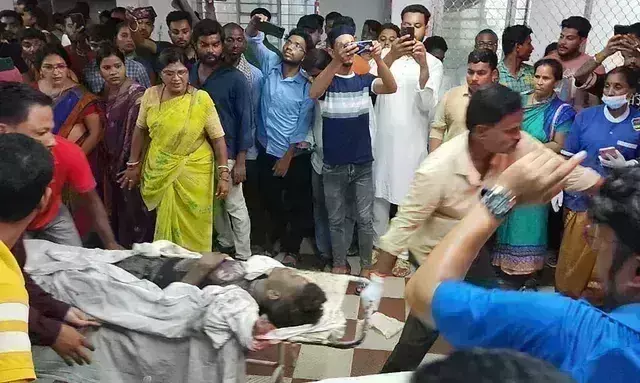Balasore Train Accident - Look Deeper, But Focus Where You Should
Many victims of the Balasore train accident are still unidentified

Tears of the near and dear ones of the nearly three hundred victims of the Balasore train accident of June 2 2023 have not yet dried up. Many bodies are still unidentified and they may not get a decent cremation or burial.
Unfortunately, attempts are already afoot to muddy the water, obfuscate the main issue, and score as many political brownie points as possible from out of the tragedy.
Facts are being twisted in a manner that amounts to blaming the State of West Bengal for the death of so many people, who were travelling in the Coromandel Express that met with the accident either to find jobs or to join their posts after spending time at home.
The other day, in an op-ed article in a leading English daily, the author argued that because West Bengal suffers from a precarious unemployment problem, a large number of migrant workers from that state, who were travelling in unreserved and sleeper class compartments of the ill-fated train, perished in the accident.
Based on this premise, the columnist urged the readers to look deeper into the Balasore tragedy. We should not just ask the railways for the safety of passengers, he said, but also question the states that cannot offer their residents economic opportunities.
Clearly, according to this article, if there were enough jobs available in West Bengal, these workers would not travel outside the state for employment and, therefore, would not have died in the accident. So, the cause of their death was as much the lack of employment in their home state as the horrible train crash.
That most of those who were killed in the accident were from West Bengal is not disputed. The question is, how is that related to the cause of their death in the mishap?
The article would have us believe that the primary cause of why they died on that day was the non-availability of jobs in Bengal. The remote cause, perhaps was the accident. What an argument, indeed!
I wonder what argument would be given if instead of being poor Bengali labourers the dead were rich Gujarati merchants. Also, it is an indisputable fact that no one would have died if there were no passengers on that train!
The Constitution of India guarantees all its citizens the freedom to move from one place to another, to work or do business wherever they want, and to settle down wherever they wish. It is ridiculous to hint that people of a state (be they migrant labourers or qualified professionals) should remain within its boundaries and should not travel by train because there could be accidents!
Supposing that all those who died in the mishap of June 2 were pilgrims going from West Bengal to Madurai or Rameswaram to visit the wonderful temples in those cities. Would we then say, "Oh God, had those temples of yours been located in Bengal, then the pilgrims won't have been killed in the accident?" That would be as laughable as saying poor migrant labours would not have died if they got jobs in their states.
It is not that those putting forth such bizarre arguments are dumb. They know better than anyone else the hollowness of their arguments but are helpless. After all, they have to save their skins by doing as they are told.
The true intention behind proffering such arguments is two-fold. First, to deflect the criticism that the failure, whether mechanical or human, can be ultimately traced to the Railways' stress on showing off newer trains rather than strengthening the basics; second, to extract as much political mileage as possible even from out of this tragedy.
It is a fact that, given the opportunity, people do not like to leave their homes or home states in search of employment or business. The first choice of most job-seekers is naturally to be as near to their native places as possible.
However, it speaks volumes about the lop-sided development of the country when we find thousands travelling out of their provinces to places where opportunities are more plentiful.
Logically, people from states and even countries with lesser possibilities of sustenance will move to places in or outside the country where more such opportunities exist. As Bengalis are moving to Bengaluru or Kerala in search of jobs, Keralites are also moving to the Gulf countries for the same reason, better opportunities to earn a decent living.
We must not only question the states for their inability to make sure its residents get jobs within the state itself, but we must also ask the government of the Union as to why some of its limbs are malnourished, while others are healthy, and what action it has taken for balanced growth of the country as a whole.
But those are issues related to economic development and should be raised at the appropriate forum. They have absolutely no relation to accidents in which hundreds of train or plane passengers are killed, mostly due to “human or mechanical failures.”
Therefore, while discussing the Balasore accident and finding the real cause of the mishap, instead of beating around the bush and channelling the discussion towards the level of unemployment in some states, it would be best to ask the Railways to look deeper into the root of such accidents and ensure they do not recur.
Sandip Mitra retired from the Indian Foreign Service. Views expressed here are the writer’s own.



